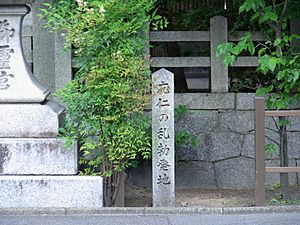Ōnin facts for kids
Ōnin (応仁) was a special time period in Japanese history, like how we have years today. It was a "Japanese era name" or nengō, which means "year name." This era came after the Bunshō period and before Bunmei.
The Ōnin era started in March 1467 and ended in April 1469. During these years, the emperor of Japan was Emperor Go-Tsuchimikado.
What Happened During the Ōnin Era?
During the Ōnin era, the emperor gave a special name to the shogun Yoshimasa's large house. It was called Higashiyama-dono. However, work on this grand house was stopped because of a big war.
The Ōnin War
The Ōnin War began in 1467. This war is called Ōnin no ran because it started in the Ōnin era. The fighting began over a disagreement about who should become the next shogun. The shogun was a powerful military leader who ruled Japan.
The shogun, Ashikaga Yoshimasa, wanted to retire. But he couldn't decide if his brother, Ashikaga Yoshimi, or his son, Ashikaga Yoshihisa, should take his place. This disagreement led to a huge war.
- 1467 (Ōnin 1, 1st month): Two powerful leaders, Yamana Souzen and Hatakeyama Yoshinari, gathered their armies around Muromachi-dono in Heian-kyo. This building was the main office for the Ashikaga government.
Different groups of powerful lords, called daimyo, fought each other to gain control. The war lasted for many years, but in the end, no one truly won. The fighting simply stopped because both sides became too tired to continue.
Related pages
More Information
- National Diet Library, "The Japanese Calendar" – a look at Japanese calendars with pictures from the library's collection
| Keichō | 1st | 2nd | 3rd |
|---|---|---|---|
| 1467 | 1468 | 1469 |
| Preceded by: Bunshō |
Era or nengō: Ōnin |
Succeeded by: Bunmei |
 | Bayard Rustin |
 | Jeannette Carter |
 | Jeremiah A. Brown |


